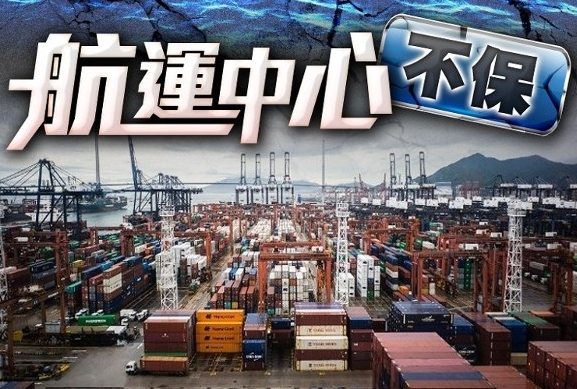Hong Kong’s Cargo Throughput May Drop Out of Global Top 10
Hong Kong’s Status as a Transshipment Hub Declining — Government Unveils Maritime and Port Development Strategy Action Plan
Hong Kong’s position as a port transshipment hub is on the decline. On the 20th, the Hong Kong government released the Maritime and Port Development Strategy Action Plan, outlining four key directions to enhance competitiveness. The plan also identifies several weaknesses of the city’s ports, including challenges in price competitiveness, slow implementation of green port initiatives, lack of full automation, and manpower shortages. To address these issues, the government proposed 10 strategic directions and 32 recommended actions.
The initiative was first announced in February this year, with the goal of unlocking Hong Kong’s potential in maritime and port development. Deputy Secretary for Transport and Logistics and Commissioner for Maritime and Port Development, Ms. Vivian Chan, highlighted key points of the action plan. She emphasized that the maritime and port industry plays a vital role in Hong Kong’s economy, contributing 4.1% to the city’s GDP (around HK$111.8 billion) and accounting for 2.1% of total employment, providing approximately 78,400 jobs.

Director of Marine, Ms. Yuen Siu Wai, stated that before the COVID-19 pandemic, Hong Kong’s port fee revenue was nearly HK$200 million annually, but for the full year of 2023/24, the revenue is only about slightly over HK$100 million. Regarding Hong Kong’s container throughput ranking 9th globally in 2022, there are concerns it may fall out of the top 10 in the future.
Secretary for Transport and Logistics, Mr. Lam Sai Hung, said that as of October this year, compared to 2022, Hong Kong’s throughput volume has dropped by approximately 13 to 14%. He noted that port activity is heavily influenced by global external economic factors, some of which are beyond Hong Kong’s control. Nevertheless, Hong Kong’s reputation as a free port, its punctuality, and simple tax regime remain key advantages. The government will explore ways to further enhance Hong Kong’s port status.
Lam also highlighted that Hong Kong is the only city in China that operates under common law, which he believes is attractive to other countries. Although Hong Kong’s port fees are not as low as those in the Greater Bay Area, it still retains advantages such as high efficiency. He mentioned ongoing studies on tax incentives beyond shipping management, agency, and leasing, but declined to provide exact figures on potential tax benefits at this stage.
When asked if the 32 recommended actions serve as government Key Performance Indicators (KPIs), Lam replied that each action has a specified timeline indicating when different measures will be implemented, with continuous reviews planned to assess effectiveness and update if necessary. He added that with its superior geographic location and advantages, Hong Kong definitely has the potential to become a world-class port.
Additionally, Ms. Vivian Chan stated that within the coming year, feasibility studies will be conducted on providing high-quality green fuel bunkering and developing an action plan. From next year onwards, the government will collaborate with the Hong Kong Maritime and Port Board to promote sustainable green development in the industry, nurture talents, and commission consultancy studies on building interconnected information platforms linking airports, ports, and other logistics facilities. The Investment Promotion Agency will intensify efforts to attract shipping companies to establish bases in Hong Kong and explore tax reduction measures targeting key maritime business sectors, aiming to secure new cargo sources.
Regarding talent development, Permanent Secretary for Transport and Logistics, Ms. Chan Mei Po, said cultivating talent is a vital measure, with most initiatives to start in 2024. The Maritime and Aviation Talent Training Fund is expected to benefit up to 90,000 participants, with hopes of significantly increasing the number of beneficiaries in the future. Moreover, there will be cooperation with the Greater Bay Area and other ports to explore additional opportunities, such as deepening talent exchange and mutual recognition of qualifications.
